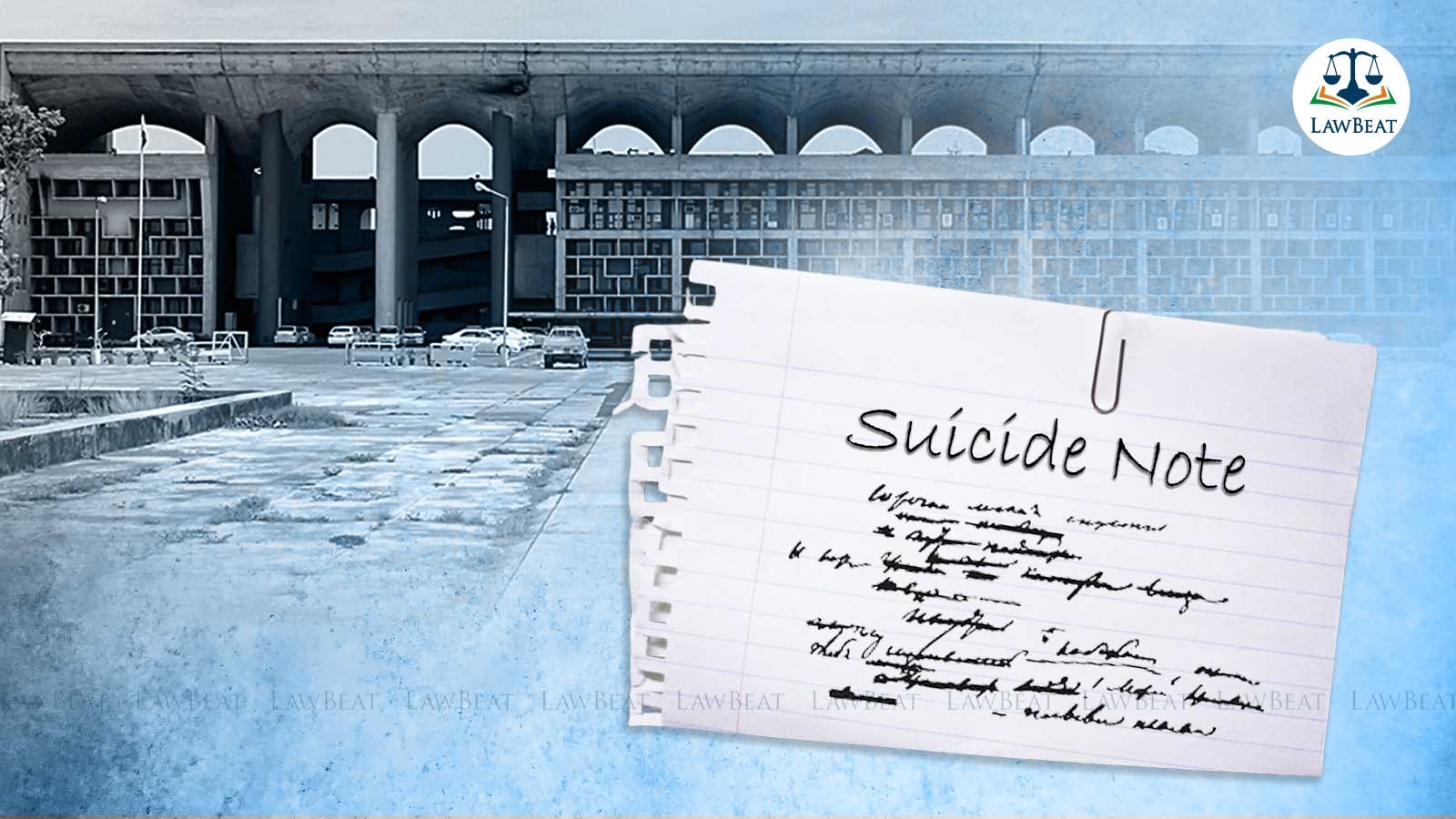Being Named In Suicide Note Not Sufficient To Constitute Abetment of Suicide : Punjab & Haryana HC

The court underscored that “apparently a person of ordinary prudence would not have committed suicide in similar circumstances but the deceased did due to his hypersensitive nature”
The Punjab & Haryana High Court has ruled that merely being named in the suicide note does not constitute the offence of abetment of suicide unless there is aiding, instigating or abetting the deceased to commit suicide.
The court, presided over by Justice Jasjit Singh Bedi, was hearing a petition filed under Section 482 of Code of Criminal procedure (Cr.P.C.), sought the quashing of a First Information Report (FIR) dated April 20, 2022, registered under Sections 306 and 34 of the Indian Penal Code (IPC) at Police Station City Rewari, District Rewari, Haryana and all subsequent proceedings arising out of it.
The court observed that “to constitute abetment, there must be a proximate and live link between the occurrence and the subsequent suicide inasmuch as the instigation or illegal act of omission or commission at the hands of the accused must be the only factor which subsequently led the deceased to commit suicide. To constitute abetment, the intention and involvement of an accused to aid or instigate the commission of suicide is imperative. There must be a positive act on the part of an accused to aid or instigate the deceased to commit suicide. Further, merely being named in a suicide would not by itself establish the culpability of an accused until the ingredients of an offence are made out.”
The case originated with an FIR, lodged by Suresh Kumar, brother of the deceased Anil Kumar. He reported that Sunil Kumari, Anil Kumar's wife, called him to inform that Anil had strangulated himself. Upon reaching home, Suresh found Anil hanging from the ceiling fan with a rope. Anil was declared dead at the hospital. A suicide note was discovered, naming Sushil Kumar @ Sushil Yadav (Petitioner No.1) and Naresh Kumar @ Naresh @ Nesi (Petitioner No.2).
The complainant's supplementary statement confirmed that Anil Kumar had financial transactions with the petitioners, who were allegedly threatening and pressuring him, leading to his suicide. Further, the statement of the deceased’s wife under Section 161 Cr.P.C. echoed these claims, stating that her husband was stressed due to the petitioners' demands for repayment, and that on the day of the incident, he committed suicide due to this stress.
The petitioners were arrested and disclosed that the deceased had taken loans from them, repaying some but defaulting on others. They admitted to pressuring him for repayment. Further contenting that their act “By no stretch of imagination could be termed to be abetment as it was only natural that some amount of aggression would be used by the petitioners in order to get back their money.”
The court, after hearing both the parties, emphasised that in cases for quashing an FIR under Section 306 IPC, it must evaluate whether a person of ordinary prudence would be driven to commit suicide due to the alleged harassment. If the court concludes that the harassment was severe enough to compel such a person to take this extreme step, the proceedings should not be quashed. Conversely, if the suicide appears to be a result of the deceased's hypersensitivity or other contributing factors, rather than ordinary prudence, the court must not hesitate to quash the proceedings.
The court noted that in the present case, examination of the FIR, the statements under Section 161 Cr.P.C., and the suicide note revealed no specific incidents of acute harassment likely to drive the deceased to suicide.
The court found no positive acts by the petitioners that would aid or instigate the deceased to commit suicide. The allegations and records did not establish that the petitioners intended to push the deceased to such a state that he would ultimately commit suicide. “Therefore, apparently a person of ordinary prudence would not have committed suicide in similar circumstances but the deceased did due to his hypersensitive nature,” the court said, while holding that the ingredients of Section 107 IPC, which defines abetment, were completely lacking in this case.
The court referred to the Supreme Court's ruling in ‘State of Haryana & Others vs. Ch. Bhajan Lal & Others’, 1991(1) R.C.R. (Criminal) 383, outlining scenarios where quashing an FIR is appropriate. These include :
- Allegations in the FIR do not constitute any offence.
- Allegations do not disclose a cognizable offence.
- Uncontroverted allegations and supporting evidence do not reveal any offence.
- Allegations constitute only a non-cognizable offence without a Magistrate's order.
- Allegations are absurd or inherently improbable.
- Legal bars to the institution or continuation of proceedings exist.
- Proceedings are manifestly attended with mala fide intentions or ulterior motives.
The court further highlighted that if a person succumbs to debt pressure and the creditor is deemed an abettor to the suicide, it would unjustly harm the legitimate interest of creditors asking for their money in a reasonable manner. “At the very best what could be said is that the deceased was pressurized to return the loan amount received by him from the petitioners and nothing more,” it observed.
Considering these principles, the court examined the FIR and the reports under Sections 173(2) and 173(8) Cr.P.C, holding that the uncontroverted allegations in the FIR and the evidence collected did not disclose any offence by the petitioners.
In view of the above findings, the court found considerable merit in the plea of the petitioners. Subsequently, the FIR as well as the supplementary report under Section 173 and all subsequent proceedings were quashed.
Cause Title: Sushil Kumar @ Sushil Yadav & Another v State of Haryana & Another [CRM-M-41891-2023]
